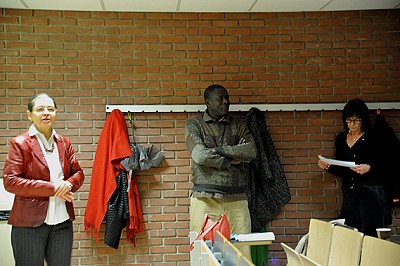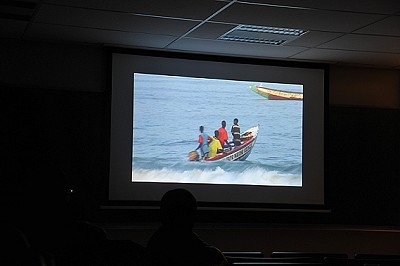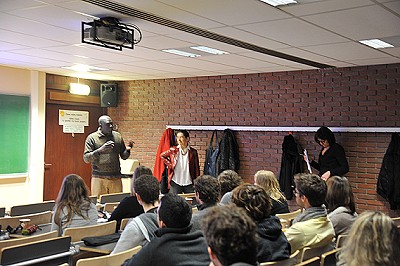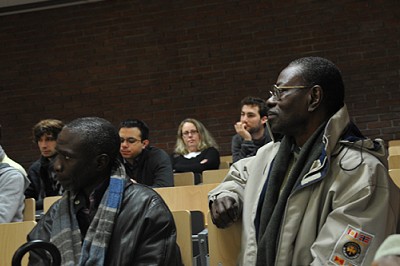5 March 2012 - Cine-debate "Kayar - l'enfance prise aux filets"
Forum H, Campus de la Pleine
in the course of Prof. Lancelot, with Aliou Sall and Cornelia E Nauen as discussants (photos P. Bottoni).
 Prof. Christiane Lancelot (in the photo to the right) is a marine ecologist and modeller at the ULB with many years of research and high-level publications with the leading scientists in the field under her belt. She invited Mundus maris to her course of MSc bio-engineer students to present and discuss the film. She introduced the general purpose and context of the cine-debate as part of Campus Plein Sud 2012.
Prof. Christiane Lancelot (in the photo to the right) is a marine ecologist and modeller at the ULB with many years of research and high-level publications with the leading scientists in the field under her belt. She invited Mundus maris to her course of MSc bio-engineer students to present and discuss the film. She introduced the general purpose and context of the cine-debate as part of Campus Plein Sud 2012.
Aliou Sall and Cornelia E Nauen introduced the specific context of progressive resource degradation in the once rich fishing grounds in Kayar, in Senegal, and the devastating effect this had on the social and economic situation of the fishing community there.
 The wider trends, of which the individual case was one example, had already been quantitatively and qualitatively described and analysed in the International Symposium "Marine Fisheries, Ecosystems and Societies in West Africa - Half a Century of Change", convened in Dakar, Senegal, from 24 to 28 June 2002, just months before the World Summit on Sustainable Development in Johannesburg, South Africa.
The wider trends, of which the individual case was one example, had already been quantitatively and qualitatively described and analysed in the International Symposium "Marine Fisheries, Ecosystems and Societies in West Africa - Half a Century of Change", convened in Dakar, Senegal, from 24 to 28 June 2002, just months before the World Summit on Sustainable Development in Johannesburg, South Africa.
A film has, of course, an entirely different quality to it. You see old and new situations with different eyes as the images create other associations and emotions in the viewer than a scientific or even a journalistic report about rigorous research will.
The film illustrates in close-up images the daily life of a boy taken out of the school to take the place of his elder brother in the pirogue, who emigrated to Spain, when overfishing made it more difficult to make ends meet.
The film also touches on several other effects on the economic decline in the lives of villagers in Kayar arising from overfishing and the difficulties to respond to changing circumstances.
 A review of the film, an interview with the film maker, Thomas Grand, and the first minutes of the film itself, can be seen on this website in the section on film reviews. Click here to see.
A review of the film, an interview with the film maker, Thomas Grand, and the first minutes of the film itself, can be seen on this website in the section on film reviews. Click here to see.
Following the projection of the film, the ensuing debate focused very much on what could be done to address the key problems highlighted.
Among these, improving schooling conditions, child care, health care and viable alternatives to fishing in order to enable sustainable fisheries in the future.
The African participants of the workshop "Learning, teaching and practising sustainable development", which had taken place 2-3 March as another part of the Campus Plein Sud programme, had also come along to the film screening and the discussion with the students.
 The animated discussion showed a good understanding of the students of the points raised in the film and by the discussants. It also brought to light the difficulties to find widely accepted ways to act taking into account sometimes conflicting interests. By way of example supporting the schools depends, not only on the initiative of the school teachers, the parent committee and supporters such as Mundus maris, but also on the ordinary and investment programmes of the ministry of education and its district representatives, the municipality, the credibility of the municipality's development plan and the resources that could be mobilised by various parties to implement any agreed priorities.
The animated discussion showed a good understanding of the students of the points raised in the film and by the discussants. It also brought to light the difficulties to find widely accepted ways to act taking into account sometimes conflicting interests. By way of example supporting the schools depends, not only on the initiative of the school teachers, the parent committee and supporters such as Mundus maris, but also on the ordinary and investment programmes of the ministry of education and its district representatives, the municipality, the credibility of the municipality's development plan and the resources that could be mobilised by various parties to implement any agreed priorities.
The session was concluded with an invitation to the students to combine their thematic studies with civil engagement so as to be able to work in interdisciplinary teams that can help bring about robust solutions to the sort of intricate and multi-faceted challenges visited in the film.









